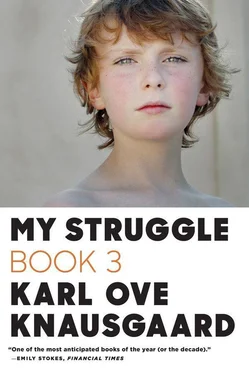We made a dam, but the sand we shoveled up kept collapsing, and when we caught sight of Jacobsen’s car coming up the hill, we didn’t hesitate, we dropped our spades and ran down to their house, where the car was parking at that moment. A bluish ribbon of smoke floated in the air behind the exhaust pipe. The father got out on one side, as thin as a stick, with a cigarette stub in the corner of his mouth, he bent down, pulled the lever underneath the seat, and pushed it forward, so that his two sons, Big Geir and Trond, could get out, while the mother, small and chubby, red-haired and pale, let out their daughter, Wenche, on her side.
“Hi,” we said.
“Hi,” said Geir and Trond.
“Where have you been?”
“To town.”
“Hello, boys,” their father said.
“Hi,” we said.
“Do you want to hear what 777 is in German?” he said.
“Yes.”
“ Siebenhundertsiebenundsiebzig !” he said in his hoarse voice. “Ha ha ha!”
We laughed with him. His laughter morphed into coughing.
“Right then,” he said when the fit was over. He inserted the key in the car-door lock and twisted. His lips kept twitching, and one eye, too.
“Where are you off to?” Trond asked.
“Dunno,” I said.
“Can I join you?”
“Of course you can.”
Trond was the same age as Geir and me, but much smaller. His eyes were as round as saucers, his lower lip was thick and red, his nose small. Above this doll-like face grew blond, curly hair. His brother looked completely different: his eyes were narrow and crafty, his smile was often mocking, his hair straight and sandy brown, the bridge of his nose freckly. But he was small, too.
“Put your rainjacket on,” his mother said.
“I’ll just get my jacket,” Trond said, and ran indoors. We stood waiting without saying a word, our arms down by our sides like two penguins. It had stopped raining. A light wind shook the tops of the tall, slim pine trees scattered round the gardens below. A thin stream ran down the hill, alongside the road, taking with it little heaps of pine needles, the tiny, yellow v ’s or bones strewn everywhere.
In the sky behind us the cloud cover had opened. The scenery around us, with all the rooftops, lawns, clumps of trees, ridges, and slopes, was now suffused with a kind of glow. From the hill above our house, which we called the mountain, a rainbow had risen.
“Look,” I said. “A rainbow!”
“Wow!” Geir said.
Up at the house, Trond had closed the door. He started running toward us.
“There’s a rainbow over the mountain!” Geir said.
“Shall we go and look for the pot of gold?”
“Yes, let’s!” Trond said.
We ran down the slope. On Karlsen’s lawn Anne Lene, Kent Arne’s little sister, stood watching us. She was wearing a safety harness; it was attached to a strap so that she wouldn’t run off. Her mother’s red car was parked in the drive. A light shone from a wall lamp. Outside Gustavsen’s house Trond slowed down.
“I’m sure Leif Tore would like to join us,” he said.
“I don’t think he’s at home,” I said.
“We can ask anyway,” Trond said, walking between the two brick gateposts, which were not hung with any gates and therefore subject to my father’s ridicule, and into the drive. A hollow metal globe, from which protruded an arrow, all carried by a naked man with a bent back, was cemented to the top of the posts. It was a sundial, and my father made fun of that, too, for what was the point of two sundials?
“Leif Tore,” Trond shouted. “Are you coming out?”
He looked at us. Then we all shouted.
“Leif Tore! Are you coming out?”
A few seconds passed. Then the kitchen window was opened, and his mother stuck out her head.
“He’s coming now. He’s just putting on his rain gear. You don’t need to shout anymore.”
I had a precise picture of this pot. Large and black, with three legs, full of glittering objects. Gold, silver, diamonds, rubies, sapphires. There was one at each end of the rainbow. We had looked for it before, without any luck. It was important to be quick, rainbows never lasted long.
Leif Tore, who for a while now had been a shadow behind the yellow glass of the door, opened it at last. A wave of warm air streamed out from behind him. It was always so hot in their house. I caught a slight odor of something that was both acrid and sweet. That was how it smelled in their house. All the houses apart from ours had their own smell, this was theirs.
“What are we going to do?” he said, slamming the door behind him and making the glass rattle.
“There’s a rainbow on the mountain. We’re going to search for the pot of gold,” Trond said.
“Come on then!” Leif Tore said, breaking into a run. We followed, down the last part of the hill and onto the road going up toward the mountain. Yngve’s bike still wasn’t back in its place, I could see, but both Mom’s green Beetle and Dad’s red Kadett were there. Mom had been doing the vacuuming when I left, it was awful, I hated the sound, it was like a wall pressing itself against me. And they opened the windows while they were cleaning, the air indoors was freezing cold, and it was as if the cold were transmitted to Mom as well, she had no space left in her for anything else when she stood leaning over the wash tub, wringing the cloth, or when she pushed the broom or the Hoover across the floor, and since it was only in this surplus space that there was room for me, I also got cold on these Saturday mornings, in fact so cold that the chill penetrated my head and even made it difficult to lie on the bed reading comics, which normally I loved, so that in the end I had no choice but to get dressed and run outside and hope there was something happening there.
Both Mom and Dad did the cleaning in our house, which was not the norm; to my knowledge none of the other fathers did it, with the possible exception of Prestbakmo, but I had never seen him do it and actually doubted whether he would submit to that kind of work.
But on this day Dad had been to town to buy crabs at the harbor, after which he had sat in his office smoking cigarettes and perhaps marking essays, perhaps reading documents, perhaps fiddling around with his stamp collection, or perhaps reading The Phantom.
On the other side of our creosoted garden fence, where the path to B-Max started, water from a manhole cover had flooded the forest floor. Rolf, Leif Tore’s brother, had said a few days ago that it was Dad’s responsibility. “Responsibility,” that was not a word he would normally use, so I guessed he had got it from his father. Dad was on the local council, they were the people who made the decisions on the island, and that was what Gustavsen, Leif Tore and Rolf’s father, had meant. Dad had to report the flooding so they could send someone to do the repairs. As we walked up and my attention was again caught by the unnaturally large amount of water between the small, thin trees, with the odd bit of white toilet paper floating in it, I decided to tell him if the opportunity arose. Tell him he would have to report it at the Monday meeting.
There he was! In his blue waterproof jacket, with no hood, his old jeans, which he wore whenever he was going to work in the garden, and his green knee-high boots, he rounded the corner of the house. His upper body was twisted slightly to one side as he was carrying a ladder with both hands across the lawn, and then he dug it into the ground, straightened up, and pushed it into position against the house roof.
I turned back and sped up to catch the others.
“The rainbow’s still there!” I shouted.
“We can see it, too!” Leif Tore cried.
I caught up with them at the start of the path, walked behind Trond’s yellow jacket between the trees, which shed a shower of rain every time anyone lifted a branch, down to the brown house where Molden lived. He didn’t have any young children, only a teenager with long hair, big glasses, brown clothes, and flared trousers. We didn’t even know what his name was, we just called him Molden.
Читать дальше












